Pakistan has been hit by flash floods since August 26, 2022 which resulted in many victims. The Pakistani government declared a national emergency after more than 1,000 people died in the disaster.
The biggest flood in Pakistan’s history resulted in at least more than 1,400 people including more than 350 children having lost their lives, 1,600 people were injured, 287,000 houses were destroyed, 662,000 houses were damaged, 735,000 livestock had died and 2 million hectares of crops were affected, up to severe damage to communications infrastructure in Pakistan.
MINA News Agency together with the Humanitarian Institution Ukhuwah Al Fatah Rescue (UAR) on Thursday had the opportunity to meet with the Pakistani Ambassador in Jakarta Muhammad Hassan, to express condolences for the flood disaster that hit the country.
The Pakistani Ambassador expressed his gratitude for the visit and support from MINA and also UAR for the Pakistani people who were affected by the floods.
Also Read: The Two-State Solution (Palestine–Israel) in Historical Perspective
“Let me thank all of you who showed your sympathy and solidarity to the Pakistani people, who are being affected by the floods and we really appreciate it,” Hassan said.
On that occasion, MINA also conducted an interview about the current situation in Pakistan and what is the main cause of the flooding that occurred this time. The following is an excerpt from MINA interview with the Pakistani Ambassador:
How is the latest conditions on Pakistan after the calamity floods
Unfortunately, Pakistan has been hit by unprecedented rainfall, flooding and a lot of destruction. Well, this was a part of the calamity due to climate change. Nobody would have been experienced this so far, you know, almost one third of the country under water and then almost 33 million people are affecting seriously in those areas today.
Also Read: Enchanted by K-Dramas, Dragged into Slander: Time for Muslims to Rise!
Almost 1400 people confirmed deaths, including 350 children. It damage crops, damage to livestock. This is really difficult to say at this moment.
What is the main cause of flood this year?
Definitely it is because of the climate change. We are one of the country which is very low carbon. We are highly sensitive to climate change.
In the northern we have the largest glacier outside poles area. So you can imagine when temperature increases. But flood this time is because of rain falls directly come to the south area. This never happened before even nine times more than usual, so no one could anticipated.
Also Read: Creating Opportunity and Avoiding Misery; Lesson Learn on Waste Recycling Issue
So far, How is the handling of this disaster?
A lot of countries and agencies are sending aids on daily basis. It is not only the national government but the rescue operation, education agencies, relief operations, the UN agencies, everyone is going to there. So in this is such a thing here, you know, nobody can stay silent, actually, they see the devastation, and they also see the commitment of the government of Pakistan help those its people.
Will the government of Pakistan open the entry of NGOs from other countries to help in this disaster?
Yes, if there is any NGO from other countries want to come the proces will be simplify and NGO really cooperation to Pakistan we very welcome. We really need them. We welcome from any part of the world or any NGO, any organization.
Also Read: Between the Treaty of Hudaybiyyah and Ceasefire in Gaza
What is the most needed for people of Pakistan who affected by this calamity?
The most needed items at this moment is food, shelter, medicine and then, you know, building houses and compensating funded their losses because, you know, their all crops be lose and animals be lose. Those people, they need sustenance for another six months to grab something.
But the most immediately need is on the security, safety and then the education, especially for women and children.
What are the steps and policies of the Pakistani government in dealing with the disaster?
Also Read: Peace Cannot Be Achieved Without a Palestinian State
You know, we have faced this calamity twice in one decade. One was in 2010 and now is major, massive so we need to look at it and we have already looking at climate change in our side. One is to lower CO2 for today but we are also focusing on putting up trees in jungles in the previous government’s agenda continue. State government, provincial government, they understand and they are looking at this.
The second thing is we need to build more dams in order to store these waters because the water which is coming from upstream to downstream is causing more damage to the suburbs in the south, so and we do not have much capacity to store water which is three times more has come during this season. So we need to build more dams on the dimensions.
The third thing is since we know already know that from where the rivers are moving and strongest flooding stakes todays. We need sophisticated canal system in Pakistan, there are five rivers coming from the mountains and whenever there is a flood it has an impact to the South. So we need to work on that how to store the waters and not damage the crops this time.
What is the your message to the international community, especially the Indonesian people, in solidarity action?
Also Read: Facing the Wall: Netanyahu and Ambitions Built on Blood
Well, I would like to first of all, thank the International Community who have come to support our national effort in whooping this massive flooding and my message is that, you know, your sympaty and your support at this, our time in mitigating the suffering that the people who are now under the threat, of course, we are happy. That you are all friends are Pakistan from all over the world.
Yes, indeed. The government of Pakistan is doing its best to keep up with this calamity, but of course, as I told you before that calamity of this magnitude was beyond the capacity of any nation. So the International support is always welcome.
How do the government of Pakistan work to cover the climate change?
Climate change is global issues. So not a single country or single region can address that issues. So we have to have a global response to the problem. Do you see that every national have different natural disasters.
Also Read: Taaruf of the Construction World: Lessons from the Collapse of Al Khoziny’s Prayer Hall
I believe that processes the UN and others which are the climate change processes that are also working for we as a nation need to do our best. (W/R7/RE1/P2)
Mi’raj News Agency (MINA)
Also Read: Fear of Being Left Behind: When FOMO Becomes a Lifestyle for Gen Z






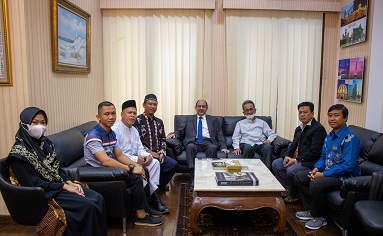




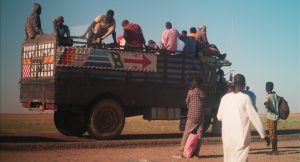






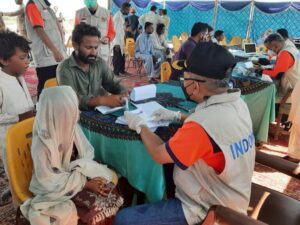

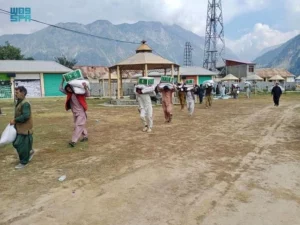
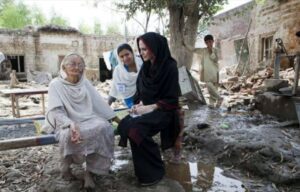



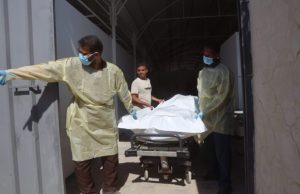



 Mina Indonesia
Mina Indonesia Mina Arabic
Mina Arabic